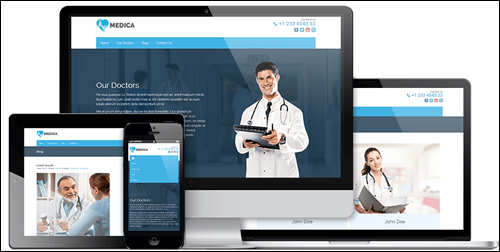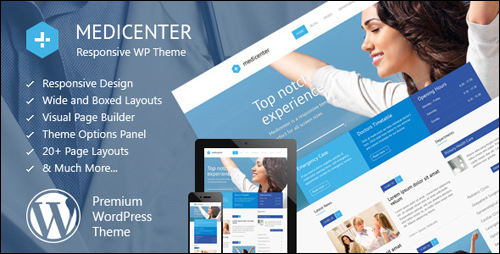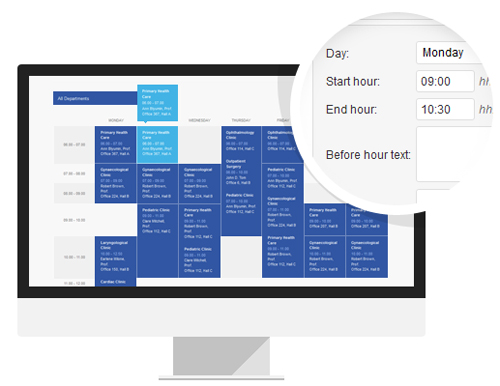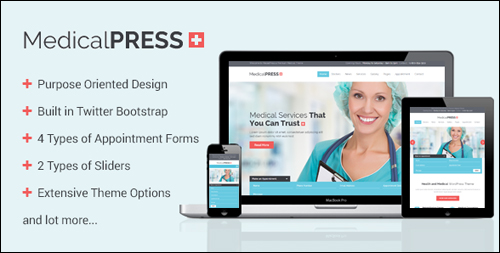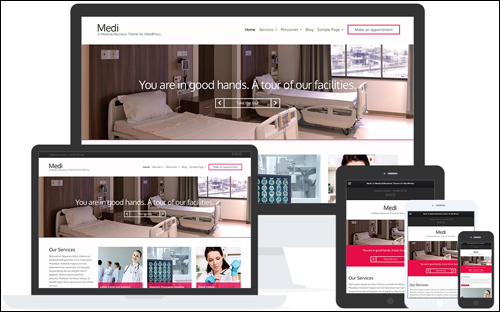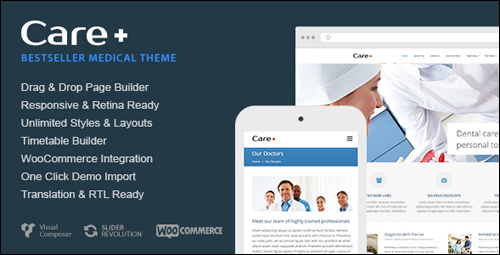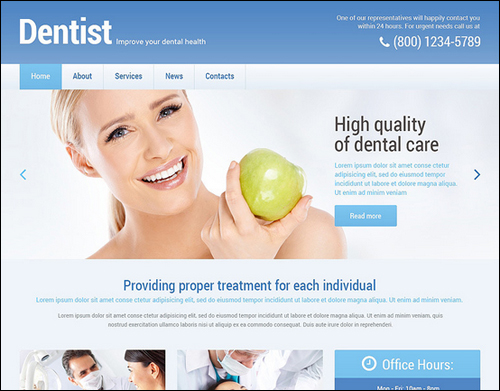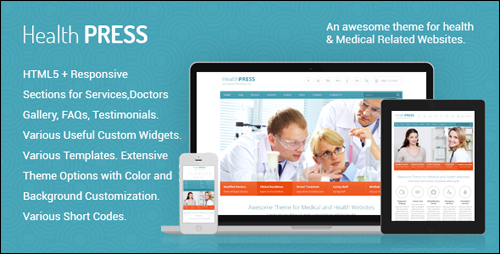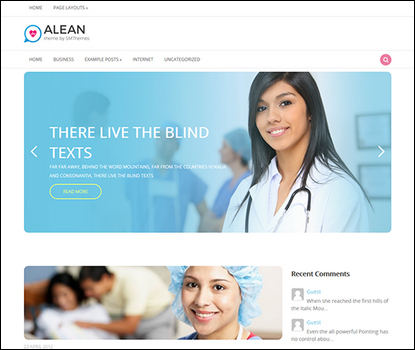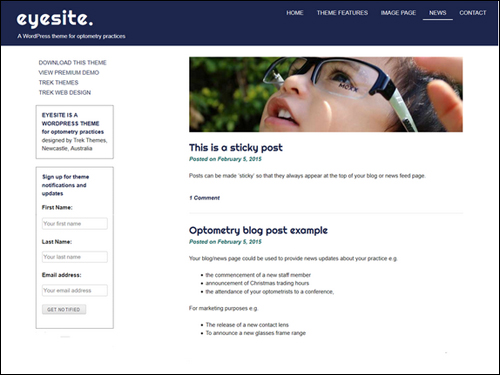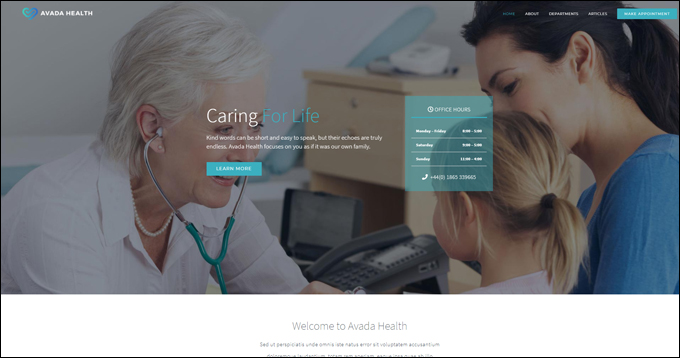
This is Part 3 of our comprehensive article series on ways to grow your health or medical-related business presence online.
So far, we have covered the following topics:
- Challenges Health Professionals Face Online
- Online Opportunities For Health And Medical Services
- Basic Web Pages For Medical Websites
- Tips On How To Improve Your Web Content
In this section, we discuss more ways to grow your medical-related services online by looking at the best WordPress themes for your business:
Best WordPress Themes For Professional Medical & Health-Related Practitioners
WordPress has many professional themes to build any type of health or medical website, including sites for doctors, surgeons, physicians, dental services, medical clinics, doctor’s offices, hospitals, and any type of health care facility or field you can imagine.
To get the most benefit out of growing your business online with WordPress, we recommend choosing a theme specifically suited for medical businesses.
Below is a list of themes for medical services and health practitioners that are highly customizable and professionally designed. Most of the themes listed here include shortcodes, plugins, widgets and page templates for doctors, FAQ’s, testimonials, contact, appointment bookings, etc. All of the themes below will help give your medical business a professional and polished look online.
Medica
(Medica Theme For WordPress)
This is a clean theme that can be used to create an impressive website for medical services. It can be a blog, a website, or both.
Medica Pro includes several widgets that increase the theme’s functionality. It includes a number of web page templates including Our Doctors, Testimonials, and Contact Us. It also includes a contact form, slider, gallery and Google Maps. You can display with a sidebar or full-width.
You can easily customize your site from your theme options area. Here you can adjust your layout, colors, business logo and social media links. You have an unlimited palette of colors to choose from. It’s responsive so it works correctly on small screen sizes. The theme is also localized so the text will translate into the language used by your site visitors. Its clean code helps your site load quickly in all browsers.
Medica a great choice for any medical business practice. The theme includes an option panel that lets you make customizations and selections for your logo, social links, color palette and page design layout. It offers unlimited color choices. Custom widgets are included. It’s a responsive theme, designed to work correctly on all devices. It’s also localization ready so your text can easily translate into the language your readers are using.
For more details about using this theme, visit the theme site: Medica Pro Theme
Medicenter – Responsive Theme
(MediCenter Theme For WordPress)
Medicenter is ideal for doctors, health clinics, hospitals and medical organizations, as well as most health-related businesses like , spas, pharmacy, or health care professionals like a dentist, surgeon, ophtalmologist, physiotherapist, psychologist, or psychiatrist, etc.
It includes predefined custom headers, over 20 web page templates, 6 home page layouts, wide and boxed layout, and an AJAX contact form so users won’t have to reload the page. It also includes the Visual Composer Page Builder plugin with 60+ page builder components and Built-In Schedule (Timetable) Manager, which allows you to add various departments and a list of doctors (or other practitioners), define consultation days and available hours, add a description or additional tooltip and present everything in timetable format.
(Built-In Schedule (Timetable) Manager – MediCenter – WordPress Theme)
You can customize your theme easily from the theme settings screen. Here you can adjust your layout, colors, logo, fonts and icons, etc. It’s responsive so it works correctly on small screen sizes.
Page building elements include sliders, pricing tables, carousel, testimonials, accordion, announcements, notifications, lists, tabs, icons, etc. There are also various layouts for home pages, galleries, blogs and more, plus a full-width slider.
For more information, go here: MediCenter Theme
MedicalPress
(MedicalPress – WordPress Theme)
This premium WordPress theme is a clean-looking, modern and fast-to-load theme. MedicalPress is an excellent theme for hospitals, health clinics, medical practitioners, dental services, ophtalmologists, psychologists, physiotherapists, psychiatrists and every type of health and medical organization.
MedicalPress includes four different appointment forms. It includes 2 different sliders including the Revolution Slider that displays links, images, videos, and more. It lets you select multiple layout options so you can present your content in 1-4 columns. It includes 3 different home page designs, plus shortcodes and templates that let you manage featured sections, appointment forms, facilities, services, gallery items, FAQ’s, client testimonials, doctors and more. It also has a return to top button.
You can customize your website any way you want using an extensive range of option settings. The theme includes the Visual Composer plugin for free so you can drag and drop page elements to create your own layouts. It’s a responsive theme so it works properly on any mobile device or size screen. It integrates with WooCommerce to handle any type of sales or payments. It includes one sample child theme.
Visit this site for more information about this theme: MedicalPress Theme
Medi
(Medi WordPress Theme)
This is an elegant premium theme featuring a drag and drop homepage that is ideal for the medical field. Medi includes a number of pre-made page layouts and adds Personnel, Services, and Slider content types. It also has lots of custom widgets like content widgets, social networking, Flickr, etc. You can select multiple color schemes and even choose a different color scheme for each page.
It’s responsive and Retina ready to look great on all screens. It’s also speed optimized to help give you a fast-loading website. It’s SEO optimized and translation ready.
Go here for more information: Medi
Care
(Care Theme)
Care is a theme aimed at doctors, dentists, and other healthcare-related fields. The theme includes a schedule manager, the Revolution Slider plugin, multiple blog layouts, pre-defined background patterns, unlimited sidebars and headers, parallax effects, and loads of additional features, including:
- Boxed & Full Width Layouts
- Can Be Used For One Page Website
- Post Format Enabled Blog
- Unlimited Sidebar Creation
- Dedicated Theme Support Forums
- And more …
The theme also includes a custom layout creator for all post types. Design the layout any way you want using the the Visual Composer drag and drop page builder plugin. It includes an advanced option panel to customize the site. This theme includes Google fonts. It’s fully responsive and Retina ready. You can specify the width of your content and add scalable vector icons.
For more details, go here: Care WordPress Theme
Dentist
(Dentist Theme)
Dentist is an elegant WordPress theme for dental services or any other health-care practice. It includes over 80 shortcodes to add many features to your site including columns, elements, comments, custom widgets for social sharing, etc., includes custom post types and formats, a filterable portfolio, sliders, many color options, and more. Stock images are also included. Page templates include FAQ, Archives, Filter Pholio Page, Full Width Page, Testimonials, Home Page, and more. Custom post types include Testimonials, Our Team, Portfolio, etc. It also includes 4 gallery scripts: Slider, Isotope, Carousel and Accordion.
The Dentist theme is built on the Cherry Framework and can be edited fully through advanced options. You have complete control over colors, styles, widths, sliders, sidebar layouts, and lots more. It includes Google Maps, return to top of the page button, and more. It’s also 100% responsive, multilingual ready, and search engine optimized.
Go here for more details: Dentist Theme
HealthPress
(HealthPress Theme For WordPress)
HealthPress is a clean-looking, SEO optimized and responsive WordPress theme made for anyone in healthcare including hospitals, health clinics, doctors, surgeons, dentists, ophthalmologists, veterinarians, psychologists, physiotherapists, psychiatrists and other types of health and medical organizations.
It has page templates and special features for managing services that include doctors, home page, testimonials, sortable gallery templates, FAQs, schedules, blog posts, etc., with multiple templates for each type. It includes 4 appointment forms and two different types of sliders including Slider Revolution. The galleries can show 2-4 columns. Multiple post types are included.
There are extensive theme options for colors, layouts, fonts, etc. Custom backgrounds are supported. There are several widgets including Google Maps, and AJAX contact form with CAPTCHA, AJAX appointment form with CAPTCHA, newsletter subscription, footer location, footer information, recent posts with thumbnail, and a quick contact form. All PSD files are included with the theme.
More information: HealthPress WP Theme
Alean
(Alean Theme)
Alean is a clean theme for medical businesses. It features a white background with a clean, responsive compact slider design. It features custom sidebars with multiple layouts. You can also have no sidebars for full-width content. It includes Google Maps, a contact form, a dynamic content loader to load your content without reloading the page, a social share bar that remains on the screen while readers scroll, powerful shopping carts that integrate fully with your website, multicolored-related posts, anti-spam without CAPTCHA, and more.
The Alean theme is built on the SMT 2.0 framework and has lots of configuration options. It is SEO optimized to help you rank higher in search engine results. There are advanced editor options so you can add design to your posts and pages. You can translate your website into any language using just one page in your administration panel.. Alean is an excellent choice for healthcare practitioners and medical service providers. It offers both a FREE and paid versions.
Incidentally, Smart Magazine Themes, the theme developer has also created several themes that are perfectly suited for anyone in the medical profession or a health-related field including health clinics, hospitals, medical practitioners, dental services, veterinarians, psychiatrists, psychologists, physiotherapists and other types of medical or healthcare organizations.
For example:
- Vaccination
- Medicine
- Dentist
- Paramedic
- Diet
- Healthcare
- Toothmed
- And many more …
To learn more about about using this theme, visit this site: Alean
Eyesite
(Eyesite)
Eyesite is a very simple, clean theme suitable for all types of health and medical practices. It’s a great choice as an information page and can be expanded with third-party plugins to include any features you want. It’s responsive so your content displays great on any device or size screen. . You can also customize the theme and change the color scheme and fonts. You can create a single page site, a website with blog, or just a blog. A premium version is available with extra fonts and color options.
Go here for more information: Eyesite Theme
Avada
(Avada Health WordPress Theme)
Avada is a fully responsive and versatile multipurpose theme that lets you easily build, configure, and run any kind of website you want without touching code, including a website for a medical or health-related organization.
To learn more about the Avada theme for WordPress, go here: Avada
Hopefully, this comprehensive guide has helped you learn about WordPress plugins and themes that can help to improve search engine optimization, increase user engagement and increase web traffic generation.

![]()
Subscribe below to receive 101+ useful WordPress tips that will help you grow your business …
***
"Your training is the best in the world! It is simple, yet detailed, direct, understandable, memorable, and complete." Andrea Adams, FinancialJourney.org
***
